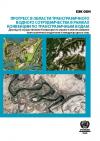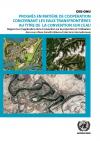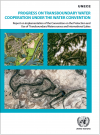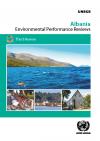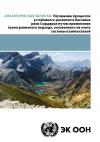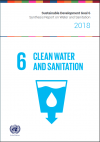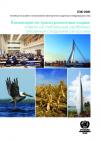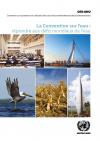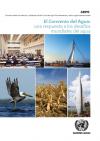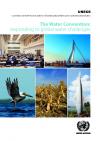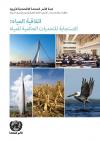Publications
Displaying Results 121 - 140 of 668
- English
Transboundary water resources are vital for populations, ecosystems and for the development of basins, but these resources are under growing pressure, making it crucial to cooperate for their effective management. However, many obstacles exist that can prevent countries from strengthening or embracing the joint management of transboundary waters in an effective way, which in turn can hinder
ПРОГРЕСС В ОБЛАСТИ ТРАНСГРАНИЧНОГО ВОДНОГО СОТРУДНИЧЕСТВА В РАМКАХ КОНВЕНЦИИ ПО ТРАНСГРАНИЧНЫМ ВОДАМ
- Pусский
In 2015 Parties to the Water Convention decided to introduce a reporting mechanism by which to monitor and assess progress in the implementation of the Convention. A pilot reporting exercise took place in 2017 and 2018, the results of which are presented in this synthesis report. The report closely mirrors the structure of the reporting template. The introduction provides the context to the
- Français
In 2015 Parties to the Water Convention decided to introduce a reporting mechanism by which to monitor and assess progress in the implementation of the Convention. A pilot reporting exercise took place in 2017 and 2018, the results of which are presented in this synthesis report. The report closely mirrors the structure of the reporting template. The introduction provides the context to the
- English
In 2015 Parties to the Water Convention decided to introduce a reporting mechanism by which to monitor and assess progress in the implementation of the Convention. A pilot reporting exercise took place in 2017 and 2018, the results of which are presented in this synthesis report. The report closely mirrors the structure of the reporting template. The introduction provides the context to the
- English
The present publication contains the third Environmental Performance Review of Albania. The review takes stock of the progress made by Albania in the management of its environment since the country was reviewed for the second time in 2012. I It covers legal and policy frameworks, greening the economy, environmental monitoring, public participation and education for sustainable development.
- Pусский
This policy brief synthesizes the main findings and recommendations from the assessment of the water-food-energy-ecosystems nexus in the Syr Darya River Basin, shared by Kazakhstan, Kyrgyzstan, Tajikistan and Uzbekistan. The methodology employed was developed specifically for assessing the nexus in transboundary basins with multi-disciplinary expertise.
The assessment aimed to foster
- English
Cooperation over transboundary rivers, lakes and aquifers is critical to ensuring that water resources are managed in an equitable and sustainable manner, and the achievement of SDG6 (water). Transboundary waters also create social, economic, environmental and political inter-dependencies that make cooperation a precondition to sustainable development, peace and security. As the only
- English
The Sustainable Development Goal 6 Synthesis Report 2018 on Water and Sanitation builds on the data available for the 11 SDG 6 global indicators. Representing a joint position from the United Nations family, the report offers guidance to understanding global progress on SDG 6 and its
- Pусский
- Français
- Español
- English
- العربية
- English
- Pусский
This publication presents the Principles for Effective Joint Bodies for Transboundary Water Cooperation that were formally adopted by the Meeting of the Parties to the Water Convention at its seventh session (Budapest, 17-19 November 2015). Countries sharing transboundary waters worldwide are encouraged to make use of them when establishing new joint bodies or strengthening existing ones.The
- Français
This publication presents the Principles for Effective Joint Bodies for Transboundary Water Cooperation that were formally adopted by the Meeting of the Parties to the Water Convention at its seventh session (Budapest, 17-19 November 2015). Countries sharing transboundary waters worldwide are encouraged to make use of them when establishing new joint bodies or strengthening existing ones.The
- Español
This publication presents the Principles for Effective Joint Bodies for Transboundary Water Cooperation that were formally adopted by the Meeting of the Parties to the Water Convention at its seventh session (Budapest, 17-19 November 2015). Countries sharing transboundary waters worldwide are encouraged to make use of them when establishing new joint bodies or strengthening existing ones.The
- English
This publication presents the Principles for Effective Joint Bodies for Transboundary Water Cooperation that were formally adopted by the Meeting of the Parties to the Water Convention at its seventh session (Budapest, 17-19 November 2015). Countries sharing transboundary waters worldwide are encouraged to make use of them when establishing new joint bodies or strengthening existing ones.The
- العربية
This publication presents the Principles for Effective Joint Bodies for Transboundary Water Cooperation that were formally adopted by the Meeting of the Parties to the Water Convention at its seventh session (Budapest, 17-19 November 2015). Countries sharing transboundary waters worldwide are encouraged to make use of them when establishing new joint bodies or strengthening existing ones.The



